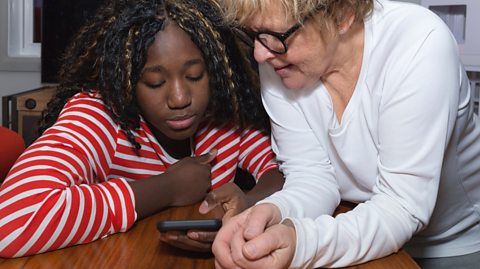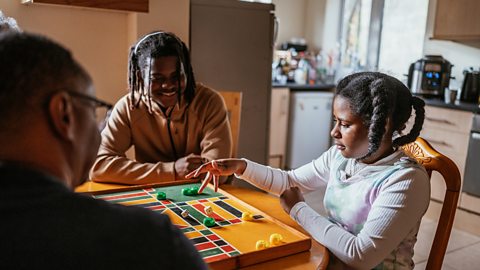
For parents wrestling with how to manage their child's mobile phone use - a new study which suggests that banning mobile phones in schools is not linked to students getting better grades, may have raised some eyebrows.
The research by the University of Birmingham involved over 1,200 pupils and suggests that banning mobile phones in secondary schools alone doesn't improve exam results, student wellbeing or classroom behaviour.
The lead author of the report, Dr Victoria Goodyear, did say reducing the time teenagers spend on smartphones should be a focus and said "We need to do more than just ban phones in schools."

We know it can be challenging to talk to your teenager about their smartphone use, so we've compiled some expert tips and advice.
1. Involve everyone in the conversation
Before you speak to your child, think about how you’d ideally like them to use their smartphone, and then ask them how they feel about their device use. Some teenagers may surprise you and say they want to reduce the amount of time they spend on their phone, where others will be feeling more relaxed about it.
According to Ofcom’s Media Literacy Report 2024, more than one in ten (96%) 12 to 15-year-olds in the UK have their own mobile phone, rising to 99% for 16 to 17-year-olds. More than one in four (44%) 16-17-year-olds surveyed feel their own screen time is too high, compared to just under a third (31%) of 8-11-year-olds.
“Discuss what you as the parents want and what your child or children want, then make a compromise to meet in the middle.”
– Dr Charlotte Armitage
Dr Charlotte Armitage is a psychologist and author of ‘Generation Zombie: Why devices are harming our children and what we can do about it’. She recommends a collaborative approach: “[Together], discuss what you as the parents want and what your child or children want, then make a compromise to meet in the middle… Make sure you encourage discussion around the positive and negative elements of reducing device use and recognise that some of it will be hard.”
When it comes to talking to your child about particular aspects of smartphone use, such as social media, Charlotte recommends learning “about the risks of spending too much time on these platforms, so you can educate your children about it”. The more informed you are, the better you’ll be able to articulate your thoughts. Then you can discuss what you feel are healthy boundaries with them. One parent, Joanne says: “Open discussions with myself have always ensured [my children] have had good technology habits and used tools to keep themselves safe."

Charlotte adds: “Frame all conversations around their health and wellbeing, because that’s what this is about – it’s not a punishment, the child hasn’t done anything wrong. The actions you choose to take to help them reduce their time online is being done in their best interests and to protect them.”
You could also ask them if a friend or another family might join in if your child is reducing their smartphone use, or restricting certain apps, as this will help them feel less isolated, and encourage in-person relationships.
2. Choose your timing well
No-one wants to talk about how they use their smartphone when they’re tired, if they’ve just got home from school or when they're about to go out somewhere. Choose an appropriate time to talk to your teenager. This could be:
- In the car or on the bus together
- At dinnertime
- Whilst watching TV or gaming together
- Before bed, when a lot of children open up more about their day.
3. Create a family agreement

You could also create a family agreement or device management plan that everyone has their say in, and that you all agree to. This could include:
- Naming device-free zones in the home
- Times of the day which are device free (such as at the dinner table and bedtime)
- Having one place to charge phones (such as in the kitchen)
- Other expectations around phone use, such as being kind to others, and prioritising face-to-face conversations.
Digital wellbeing organisation Internet Matters (among others) has an online template you can use. The key here is that everyone in your household is involved. If you think your own phone use is getting out of hand, this is your chance to put restrictions on your own scrolling! You can also include the use of parental controls as part of your family agreement – again it’s something to discuss with your child. Parent Emily uses a parental controls app for her 11- and 15-year-old: "This allows me to set downtime (at night), restrict content and apps around age and set limits on apps, as well as share location."

4. Model good smartphone use yourself

Charlotte recommends modelling healthy device use behaviours yourself, and encouraging children to point out to you when you’re using your device too much! “Children have likely seen their parents on devices from a young age and will want to have a device of their own to use as their parents and older siblings do.”
Modelling good smartphone use might include:
- Not looking at your phone when your child is talking to you
- Putting your phone away at certain times of day or for certain amounts of time
- Not checking your phone late at night
- Restricting how much time you spend on social media or other apps
- Leaving your phone charging in the kitchen or hallway at night.
It can be helpful to be open with your child about some of the challenges you face with your own phone use. For example, you could explain the impact you feel too much scrolling has had on your wellbeing, or how using your smartphone has stopped you enjoying a hobby or seeing your friend more often. It’s also important to listen to your child without judgement. Ask them open-ended questions, and really focus on what they say in return.
Talking to your child about their feelings is good for children’s emotional wellbeing, and builds the empathy that helps them to make friends.

5. Consider what activities they’ll do instead
“When we give up a habit that involves holding something in our hands, we need to replace it with something else that involves our hands too.”
– Psychologist and psychotherapist Dr Charlotte Armitage
Many children – especially teenagers – will feel their social lives are connected to their device, so it’s important to factor that in if you’re trying to reduce their screen time.

Charlotte says you’ll also need to think about what you’ll replace their screen time with: “Make a list of things that you’d like to do individually, and things you’d like to do together, then make plans to do these. This will help with reducing time on screens.
"When we give up a habit that involves holding something in our hands, we need to replace it with something else that involves our hands too. Devices have many addictive elements but tackling the habitual part of needing to reach for something and do something with your hands is a good way of starting to break the cycle. Even something as simple as having putty or modelling clay around to make things, or a pen and paper to doodle on can be helpful. These types of activities involve the hands but also require thought and creativity which can help to keep the mind active and distracted from thinking about devices.”

She added: “The positive feeling that comes from reducing time on screens such as better sleep, better focus, healthier social interactions, better connection within the family unit, improved wellbeing and improved mental health are the natural rewards that occur as a result of reducing device use. This reward helps both you and your children to make a conscious effort to maintain healthier device use behaviours.”

Parents' Toolkit
Fun activities, real-life stories, wellbeing support and loads of helpful advice - we're here for you and your child.

How technology has made parenting more difficult and how to navigate it
BBC Bitesize Parents' Toolkit looks at how widespread access to the internet for our children is causing clashes at home, with negative and positive aspects.

Five things to consider when buying your child their first mobile phone
Whether they're starting secondary school, or at primary school - at some point parents will almost inevitably have to consider buying their child a mobile phone. Here are some tips and expert advice on what to consider.

How to help your family enjoy a screen free week
Getting your family off their screens may seem an uphill struggle, but here are some tips on persuading your kids to ditch the screens for some fresh air fun!

How to set up your child’s devices safely
While your child might be super excited to explore their first devices, you might be a bit worried about their safety. Correct set up can help to keep your child and their device safe.

How you can help your child enjoy the benefits of social media
How parents can help their child explore social media more safely by discussing the dangers and positives being online.
